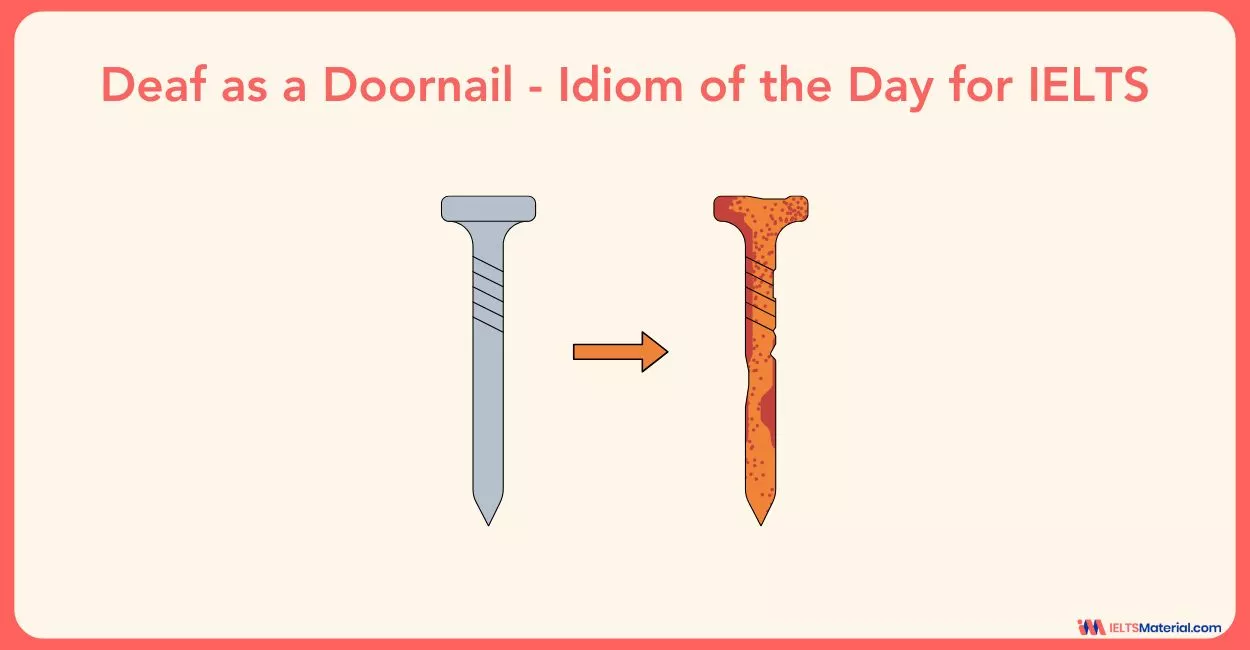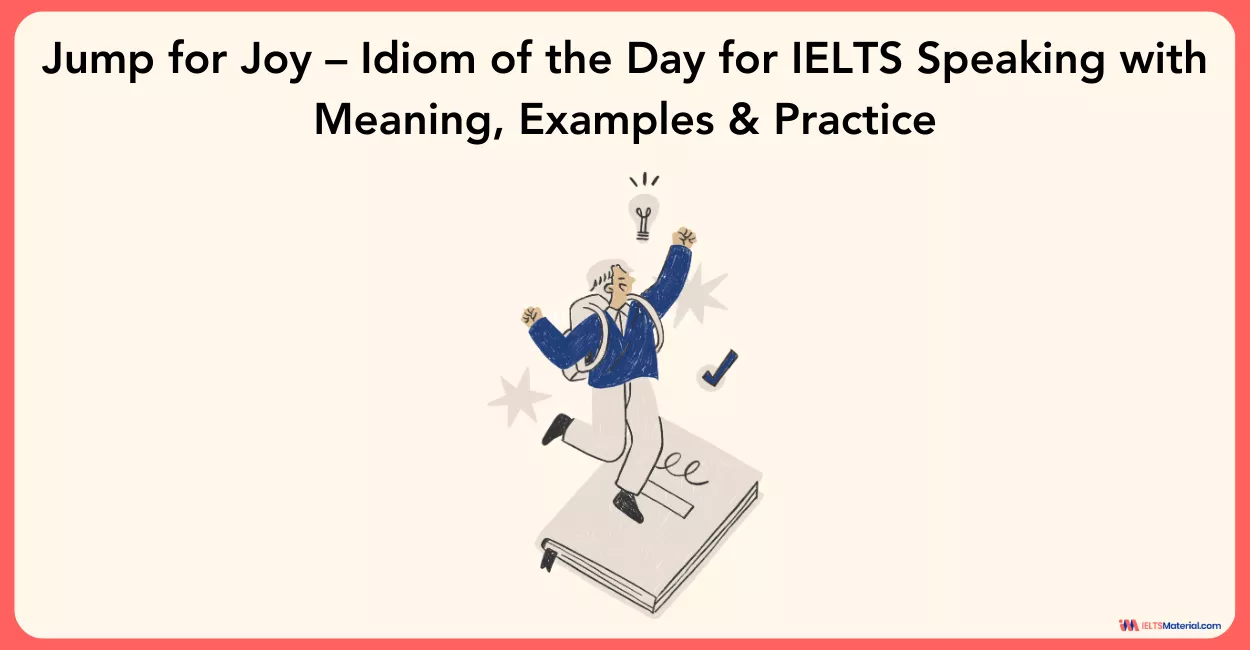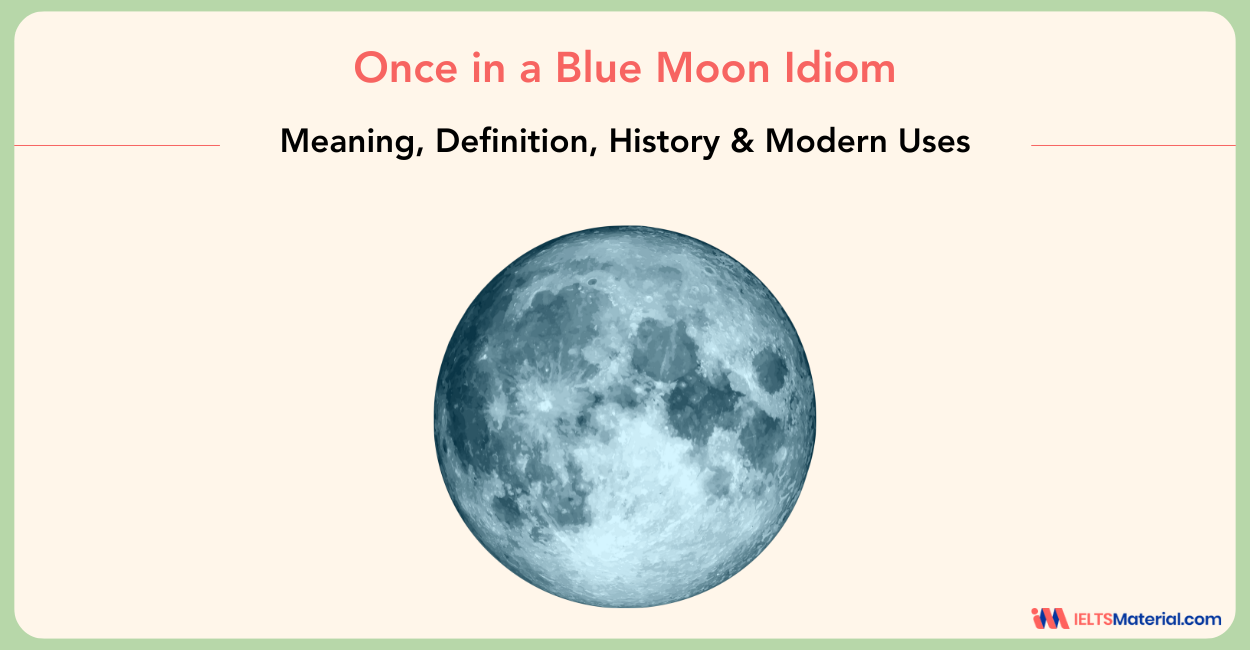Jump for Joy – Idiom of the Day for IELTS Speaking with Meaning, Examples & Practice
5 min read
Updated On
-
Copy link
Learn how to use the idiom “Jump for Joy” in IELTS Speaking to express happiness vividly. Includes definition, examples, exercises, and sample answers to help you boost your vocabulary and speaking score.
Table of Contents

Limited-Time Offer : Access a FREE 10-Day IELTS Study Plan!
In the IELTS Speaking test, your ability to express feelings and emotions vividly can significantly improve your Lexical Resource score. One effective way to do this is by using idioms that convey emotion naturally. Today’s idiom, “Jump for joy,” is a lively expression that you can use to describe happiness or excitement.
What Does “Jump for Joy” Mean?
Definition:
To be extremely happy or excited because something very good has happened.
This idiom paints a vivid picture of someone literally jumping up in the air out of sheer happiness. While people may not actually jump, this phrase is a figurative and emotional way to describe pure joy or elation.
Origin of the Idiom
The idiom “jump for joy” is believed to have originated in the 16th century and has since become a common way to express happiness in English. It combines two simple concepts, jumping and joy, to vividly show an emotional reaction. It’s often used in both casual and formal speech when someone receives exciting news, achieves a big goal, or gets a pleasant surprise.
Example Sentences Using “Jump for Joy”
Here are some updated and corrected examples of how the idiom is commonly used:
- “When I got the gift from my parents for my birthday, I jumped for joy and didn’t even look at the other presents.”
→ A strong emotional response to a surprise gift. - “My friend jumped for joy when I surprised him with tickets to his favorite band’s concert.”
→ Expresses extreme happiness about an unexpected gift. - “When I saw my IELTS exam result, I jumped for joy because I had achieved the score I needed to study abroad.”
→ Perfect usage when sharing personal achievement-related happiness.
When to Use “Jump for Joy” in IELTS Speaking
This idiom is ideal for IELTS Speakingresponses where you describe positive feelings, surprising events, or good news. You can naturally insert this expression into:
IELTS Speaking Part 1
Q: What do you usually do to celebrate good news?
A: “I usually treat myself to a nice meal or go out with friends. Sometimes, if the news is really amazing, I literally jump for joy!”
IELTS Speaking Part 2 – Cue Card
Describe a time when you received good news.
A: “A few months ago, I received an email confirming that I had been accepted into a university abroad. I was so overwhelmed that I jumped for joy and called my family right away.”
IELTS Speaking Part 3
Q: How do people in your country express happiness?
A: “In my country, people usually smile, laugh, or hug each other. Some even jump for joy when something really exciting happens.”
Want to master more high-band IELTS vocabulary for the IELTS exam? Book a Free Demo Class today.
Related Expressions and Idioms
Here are some other ways to express happiness and excitement in English:
| Idiom / Phrase | Meaning | Example |
|---|---|---|
| Over the moon | Extremely happy | “She was over the moon when she got her dream job.” |
| On cloud nine | In a state of great happiness | “He’s been on cloud nine since he passed the test.” |
| Grinning ear to ear | Smiling a lot due to happiness | “She was grinning ear to ear after her promotion.” |
| Walk on air | Feel extremely happy and excited | “They were walking on air after getting engaged.” |
Using a variety of idiomatic expressions in IELTS Speaking will show the examiner that you have a wide and flexible vocabulary.
Common Mistakes to Avoid
- Incorrect idiom usage: "Jump for you" is a grammatical error. Always say "Jump for joy."
- Misused in negative contexts: Do not use this idiom when talking about sad or disappointing events.
- Overusing: Use it only when the context truly reflects excitement or happiness.
Sample Answer Using the Idiom
Q: Describe a time you were extremely happy.
Sample Answer:
“Last year, I applied for a scholarship to study in Canada. I didn’t think I had a chance, but one day I received an email saying I had been selected. I was so shocked and thrilled that I literally jumped for joy! It was one of the happiest moments of my life.”
Vocabulary Tip for IELTS Speaking
Incorporating idioms like “jump for joy” enhances your fluency and lexical range. However, idioms must be used naturally and in context. Practice using them in mock answers to become more comfortable and confident, and boost your IELTS Vocabulary skills.
Practice Exercises
Exercise 1: Multiple Choice
“John jumped for joy about the unexpected news that his friend gave him.”
What does this sentence mean?
A. John was sad about it.
B. John was angry about it.
C. John was very happy about it.
D. John was disappointed about it.
Correct Answer: C. John was very happy about it.
Exercise 2: Fill in the Blank
Use the correct idiom:
Describe a moment when you were very excited. Use the phrase “jump for joy” in your answer.
Prompt:
"When I heard that I passed the IELTS test with a band 8.0, I ____________ because I didn’t expect such a high score!"
Answer:
"When I heard that I passed the IELTS test with a band 8.0, I jumped for joy because I didn’t expect such a high score!"
Grab the newly launched Vocabulary for IELTS (Essential words for popular topics in IELTS) to level up your preparation.
The idiom “jump for joy” is a fantastic expression to describe pure happiness and excitement. It's a great fit for IELTS Speaking topics related to emotions, personal experiences, or celebrations. When used correctly and appropriately, it adds depth and variety to your spoken English. So, the next time you want to express extreme happiness in your IELTS Speaking response, try saying “I jumped for joy!” and let your vocabulary shine.
If you're aiming for top scores, follow the IELTS Exam Preparation Tips for Band Score of 8+ to further enhance your vocabulary and overall test performance.
Also check:
Explore IELTS Resources

Start Preparing for IELTS: Get Your 10-Day Study Plan Today!
Recent Articles

Kasturika Samanta

Prity Mallick

Nehasri Ravishenbagam





Post your Comments